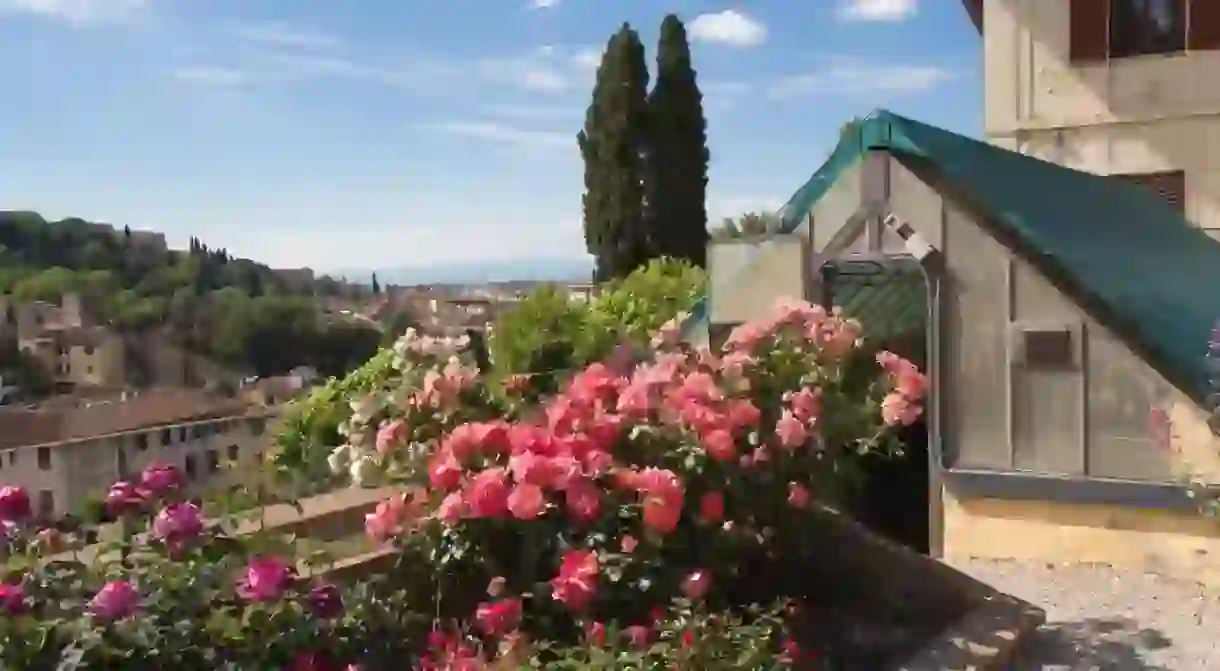The Most Beautiful Parks and Gardens in Florence

Explore the world capital of the Renaissance, where architectural genius is not just about frescoed basilicas and impressive palazzos but natural spaces, too. Florence’s majestic parks and beautiful green spaces, which feature formal gardens and harmonious designs, are true havens of calm within the city.
The historic city of Florence is utterly picturesque and charming but, like all big cities, it can also be busy and somewhat intense. There’s a lot to take in, but luckily the masterminds of Florence’s greatest landmarks also knew the importance of pleasant green spaces. And, as clever and intricate the designs of Florence’s palaces and fortress are, so too are the parks. Sit against a tree with a book, find the perfect bench to hang out on, or bring a picnic and lay down on the grass for a leisurely afternoon.
The Rose Garden
Park, Botanical Garden

The Iris Garden
Park

Situated at the opposite end of Piazzale Michelangelo to Giardino delle Rose is a garden dedicated to the iris flower, which has been the emblem of Florence since 1251. Opened in 1954, the 2.5-hectare (6.2-acre) garden is home to 250 endangered species of the iris plant and offers a place to pause – and take in the iris-perfumed air – between sightseeing and trekking on Florence’s cobblestone roads. The countryside-style setting is aesthetically balanced with panoramic views of the ever-prospering city of Florence, and the tranquil spot is particularly popular with writers, bookworms and artists. You’ll have to wait for the spring months to view the garden in all its splendour, though, as it is only open 20 days of the year (end of April to end of May). Nearby are the grounds of the annual International Botanical Competition that takes place every May and makes a great combination visit.
The Boboli Gardens
Park

Built over the course of 400 years, the Boboli Gardens were commissioned by the Medici family, and now span approximately 45 hectares (111 acres) of land. Here, history, architecture, landscaping and nature come together, never compromising on elegance, harmony or beauty. It is perhaps the most frequently visited garden in Florence, and inside you’ll find the Artichoke Fountain, the handmade Buontalenti Grotto and centuries-old cypress trees. The gardens’ amphitheatre is a great spot for a midday rest or to salute the sun in the evening. Also within the gardens is the Museum of Porcelain, from which stretches the manicured Giardino del Cavaliere (Knight’s Garden) that overlooks the sublime Tuscan hills.
Bardini Garden
Park

Giardino della Gherardesca
Park
At many palazzos in Florence, there is a hidden world behind closed doors – an urban paradise abundant in lush greenery and fragrant flowers accessible only to special visitors. One of these is located on the grounds of the Four Seasons Hotel, the Giardino della Gherardesca, which was first planted by Italian politician and author Bartolomeo Scala in the late 15th century. The garden is one of the biggest in Florence, featuring 1.8 hectares (4.5 acres) of perfectly manicured lawns, romantic walkways and majestic trees. These include the Taxus Baccata, one of the longest living evergreens in Europe, which is celebrated in the literary works of numerous renowned writers, including Shakespeare and J.K. Rowling. In 1844, the first mandarin orange trees to arrive in Florence were planted in this Renaissance garden.
Villa Stibbert
Park

Located on the grounds of the Stibbert Museum, this 19th-century garden is a calming sanctuary, tucked in the green hills near Fiesole. Its owner, Frederick Stibbert, an Englishman born in Florence and heir to a considerable fortune, purchased the property in 1849 with the intent of creating a museum. It was opened to the public in 1887, with 64 rooms set across two floors. The garden retains the same sense of medieval romanticism, with evocative temples, caves, ponds with goldfish and turtles, and an English-style garden with 56 plant species. Stibbert commissioned two temples here, too: the Hellenistic temple with a majolica dome and an Egyptian-style temple accessible by rowboat, inspired by archaeological discoveries at the time.
Torrigiani Gardens
Botanical Garden

This is an updated version of a story originally created by Nikki Crowell.













